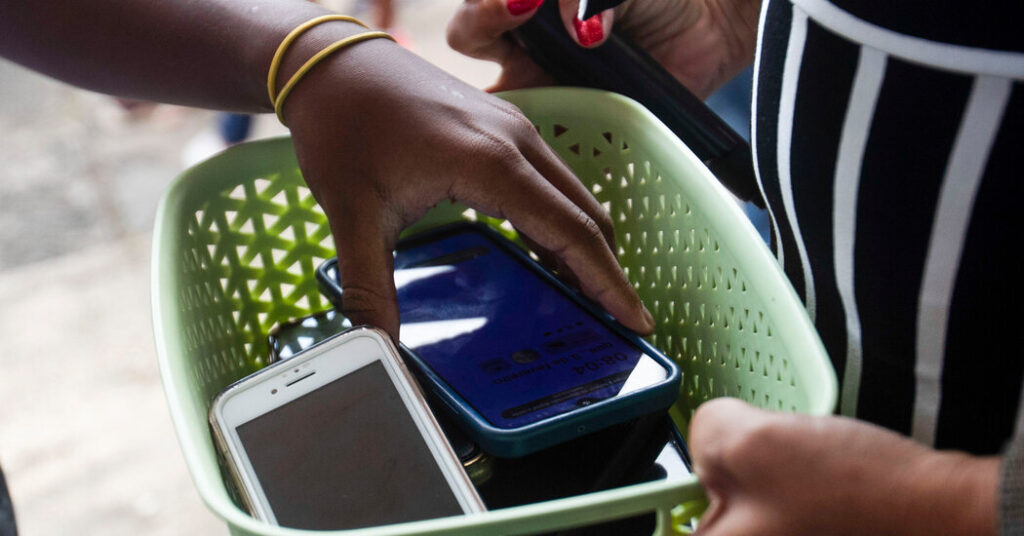Welcome to Current Events Conversation, where each week we round up some of our favorite responses to one of our student writing prompts.
For all the community, creativity and fun smartphones and social media have brought to teenagers’ lives, they have also come with a multitude of hazards, Natasha Singer writes in “Banning Social Media,” a recent edition of The Morning newsletter. Bullying, body-shaming, self-harm, dependence, the list goes on.
She outlines how, as public concern over youth mental health has mounted, government and education leaders are increasingly turning to strict bans to manage these risks — from classrooms in the U.S. locking phones in pouches to a sweeping new law in Australia that aims to restrict anyone under 16 from having a social media account.
We asked teenagers: Do these technology bans actually work?
The response was overwhelming and largely skeptical. While some students admitted that being forced to put their phones away helped them focus, the vast majority told us that bans are merely a “Band-Aid” solution. They described how they and their classmates evade such restrictions and why their school-issued devices are contributing to the problem. They also explained why they’re concerned bans don’t teach them healthy online habits or address the root issues of their technology use.
Thank you to everyone who joined the conversation this week, including students from Glenbard West High School in Glen Ellyn, Ill.; Cumberland Polytechnic High School in Fayetteville, N.C.; and Montclair High School in Montclair, Calif.
Please note: Comments have been edited and condensed.
Many students argued that bans are ineffective because teenagers will always find a workaround.
No, I do not believe technology bans work for teenagers. Outright banning technology just makes students sneakier and more malicious about their usage. Screen addiction is something that most young people struggle with given they have been reliant on technology all their lives. Taking this away “cold turkey” would just cause an uproar in its usage and lead to teens resorting to deceptive ways to get their hands on what they are being denied.
— Trinity, CPHS Fayetteville, NC
These phone bans have been more negative than positive in social communities. For example, in my school, I have noticed that people have gone the extra mile to keep their phones or something like a phone in their school lives. They have learned how to break open the Yondr pouches. They have brought in extra phones. They have brought in iPads. Taking away students’ phones has instilled a sense of unethical behavior within them.
— Makayla, Abington Friends School
I do not think tech bans work for teenagers. In my opinion I don’t think that taking away phones is removing any distractions. In most cases it actually makes it worse. Because teens’ phones are taken away, it causes people to be more sucked into their phone in the minimum times that we have phones, and it can also cause stress by not having your phone near you in necessary situations.
— Kate, Glenbard West High School
Others pointed out that school-issued laptops and iPads have become just as distracting as phones.
It is no secret that phones can be a big distraction for teenagers, however, so can the school provided technology. My school uses iPads as a tool for school work and even though there are controls in place to prevent games being downloaded, students still find ways around it. Gaming websites that bypass the controls always find a way onto several kids’ iPads. In a lot of cases these games can be more distracting than a phone because it’s easier to get away with using them.
We currently have a phone ban at schools in New York, and the outcome so far isn’t great. I could understand that they are banning phones in educational classes, because they need to focus on doing their work. But since they said you were not allowed to use them in study halls and lunches, this is causing more kids to use their Chromebook for entertainment, visiting sites that they aren’t allowed to be on.
In middle school, we all had school-issued laptops, and it seemed like every month there would be a new restrictive Chrome extension put in place. So what happened? Someone found a new, third-party browser that the teachers couldn’t access, and the entire grade had it downloaded within two days. Restrictions and technology bans are generally taken as a challenge rather than a barrier, and the reality is that they just don’t work.
— Anna, Glenbard West High School
I went to a tech-free school for 10 years. We hand wrote every single essay, and social media was severely ridiculed by teachers and staff. Screens being a distraction in class wasn’t even a thought, because there wasn’t that option. Now, I attend a high school where I am required to lock my phone in a small bag and carry it with me all day, but a fully charged laptop is a requirement for being a prepared student. (The phone ban is new this year; last year, we put phones in a hanging shoe organizer, and in the years before that, we simply kept them on us.) The phone ban, at least for me, feels confusing, because I’m not fully sure what it’s trying to accomplish. Our phones are locked up; however, laptops are still required, and thus act as a supplement for a phone. Most of the time, class begins with laptops being opened, and the words, “Go to today’s Canvas page.” The thing is, “today’s Canvas page” can be anything from the actual site to Instagram, Pinterest, Dress to Impress, 2048, the Worldle, or anything else on the rest of the internet. The phone ban is an inconvenience, but it’s not stopping distractions.
— Una, PA
However, some students admitted that despite the annoyance, the bans actually improved their focus and social lives.
I do think tech bans can work for teenagers, but only if schools actually stick to them. My school started a phone ban this year, and honestly, it doesn’t feel super serious yet. Some teachers take phones, others don’t, and a lot of people still use them. But when a teacher really enforces it, the class is way calmer and people pay more attention. So I think the idea works, it just needs better follow-through.
I think banning cellphones and social media during school hours can actually be a good idea. Even though it might feel restrictive, it helps students stay focused and engaged in class without constant distractions. Social media in particular can really drain attention and even affect students’ moods or confidence because of all the comparison and drama that happens online. Without phones, students are more likely to interact face to face, which can build stronger connections and improve communication skills. It might also reduce stress and give people a break from the constant pressure of being online all the time. While it’s not a perfect solution, limiting cellphone use in schools can encourage a healthier balance between technology and real life.
In the classes that do have the ban that I am in, it works very well. It’s like a complete social experiment. The whole class actually has real talks with each other and deep conversations like never before. One of my typically silent classes with very little human interaction, when we tried the phone ban in class one day, the whole class was very loud which was weird for such a quiet class.
A major theme was safety: Many students feel anxious being cut off from their parents in an era of school emergencies.
Schools need to allow students to have cellphones in school because of the possibility of a disaster. Imagine this, there is a fire or an intruder in the school and your guardian is at home wondering if you are okay. A simple text can relieve all of their worries and prevent them from doing a crazy action such as rushing into the school to save you.
With the increase in school shootings, many students find comfort in having their phone with them, so banning phones is not preferred. Even though students having phones increases the rates of cheating and paying less attention, it would be more beneficial to let the kids have their phones in case of an emergency.
It feels like the whole school is holding its breath, not because anything drastic happened, but because every phone has been taken away and every connection we rely on has been switched off at once. Adults might hope that this kind of environment will keep teens focused and protected. And yet taking our phones does not make the real problems fade. The worries, the friendships we lean on, the small moments of support we find online, those things do not disappear just because the phone does. Social media may create stress, but it also gives teens a place to talk, to laugh, to stay connected when life feels too heavy to handle alone. Completely removing that does not make us safer, it just makes us quieter.
When it comes to government bans like the one in Australia, students felt parents — not politicians — should be in charge.
Teenagers’ online activity should be a major concern; not only is it detrimental to mental health, its harmful impact is magnified for teenagers because of our developing prefrontal cortex. In a time when we crave belonging, search for our identity, and feel emotions more intensely than ever, we are extremely vulnerable to social media. Our self-esteem is destroyed as social media fuels comparison. Our social and emotional growth is stunted when we scroll instead of processing our feelings or connecting with our friends and family. However, I believe that the responsibility for teenagers’ exposure to social media should be left to the parents, instead of the government. We have a government to protect our rights, not to monitor our mental health. Parents are infinitely closer to us than governments — they have deeper insight into our personality, our weaknesses, and our environment. The problem of social media cannot be solved with legislation; teenagers need to be guided by individuals who care and love for them.
I think only parents and teachers should be concerned with teenagers’ activity, but if anything it is mostly a parent’s job to supervise their child’s activity online. High school is not a day care, teachers should not feel the need to babysit nearly grown men. I think that lawmakers, and especially the government, should not be concerned at all. It’s not their problem and also the government should not control the media like that. When a government can control who sees what and what is seen, that is called censorship.
— Aaron, Montclair High School, CA
Finally, students suggested that education and moderation are better solutions than prohibition.
A classroom without phones might be a quieter one, but it doesn’t teach students the self-control needed to manage screen time outside of school. In other words, it’s a temporary fix that avoids the harder work of building true digital literacy. I think that a more sustainable approach is one like the British imposed, which requires stricter privacy settings and apps to use less manipulative designs. This strategy focuses on making the digital world safer, rather than just limiting access. The ultimate goal should be to have our generation develop the critical thinking skills necessary to navigate the online world. This requires a shared effort of tech companies holding accountability for their design choices, schools integrating digital wellness into the curriculum, and we, as students, learning to be more mindful users.
— Dennis, Glenbard West High School
I believe parents should set limits or check what a child is doing on their phone, and teens need to realize what they’re doing online and be cautious. Schools can spread awareness for teenagers at schools about what happens on the internet. Devices should be used carefully instead of banning it.
If we want to discourage overreliance on technology, we have to treat the root cause rather than the symptoms. Find out what someone is getting out of their technology usage, and then figure out how you can satisfy those needs and desires without technology, if possible. Wanting a new generation that is not completely reliant on technology is a justified desire, but it is shortsighted and ineffective to only take away, rather than to give as well.
— Steven, Glenbard West HS Glen Ellyn, IL
The ideas I have for helping teenagers reduce their screen time are to bring back public spaces that they can hang out in and to stop being so negative toward teenagers. Spaces outside of school give teenagers a place that isn’t somewhere they go to everyday and can help reduce the excessive amount of screen time and increase mental health.
Learn more about Current Events Conversation here and find all of our posts in this column.
The post What Teenagers Are Saying About Technology Bans appeared first on New York Times.




